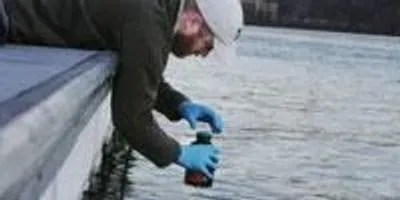 Researchers from West Virginia Water Research Institute collect soil and water samples from the Elk River in Charleston, W. Va.Photo credit: Courtesy West Virginia UniversityTo better understand the properties of the chemical that contaminated the drinking water of about 300,000 West Virginia residents earlier this month and the plumbing and water-treatment systems surrounding the area, the National Science Foundation (NSF) has awarded Rapid Response Research (RAPID) grants to research teams at three universities.
Researchers from West Virginia Water Research Institute collect soil and water samples from the Elk River in Charleston, W. Va.Photo credit: Courtesy West Virginia UniversityTo better understand the properties of the chemical that contaminated the drinking water of about 300,000 West Virginia residents earlier this month and the plumbing and water-treatment systems surrounding the area, the National Science Foundation (NSF) has awarded Rapid Response Research (RAPID) grants to research teams at three universities.
On Jan. 9, 2014, crude 4-methylcyclohexane methanol (MCHM), a chemical primarily used to clean coal, leaked from a storage tank near Charleston, W.Va., and bled into a river upstream of a water-treatment plant. As a result, about 15 percent of the state's residents were advised not to drink the water.
The main challenge for authorities managing the spill has been how little researchers know about the chemical and how it interacts with other substances.
"This is one of the largest human-made environmental disasters in this century. In instances such as this, where the situation is still developing and public health is involved, timing is everything," said William Cooper, program director in NSF's division of Chemical, Bioengineering, Environmental and Transport Systems, which funded the awards. "RAPID grants give researchers the support they need to be on the ground and to collect data immediately."
About 10,000 gallons of MCHM, which has a licorice-like odor, spilled into Elk River. The chemical entered about 1,700 miles of pipe along the river, according to local officials. Information on its toxicity and health effects is scarce.
From top to bottom: Pipes, plants and MCHM
Funding has been given to three principal investigators to study different engineering aspects of the spill.
Andrew Whelton of the University of South Alabama will examine the chemical's absorption into and removal from plastic drinking water pipes, focusing mainly on houses. Jennifer Weidhaas of West Virginia University will assess the extent of the contamination in drinking water, the treatment plant and areas near the river. Andrea Dietrich of Virginia Tech will study the physical and chemical behavior of MCHM itself in the environment, which will add data necessary to model the environmental fate of the chemical.
Together, the three studies present a systems approach that will provide a better understanding of the fate of MCHM in water systems.
"One of the concerns in this spill is authorities have little to no information about exactly what this chemical does to drinking water plumbing systems," said Whelton. "Chemicals tend to absorb more into plastic pipes than metal pipes. Plastic pipes can act as a sponge, sucking up chemicals."
While the drinking water ban was lifted by state regulators four days after the spill, uncertainty remains about the damage caused. In the meantime, local residents have been instructed to run their water to move the contaminated water out of their plumbing systems.
"I have never witnessed such a grand scientific need to characterize household plumbing system water quality," Whelton said. "We need to know more about the fundamental engineering and science of these interactions, which is why this is an NSF-funded project."
The three awards total about $150,000 and are for one year.
Broadening knowledge and participation
RAPID awards have been given before in similar circumstances, such as the 2010 Gulf of Mexico oil spill and the 2004 Indian Ocean tsunami.
Because of this particular project's nature, the three teams will work closely together to share and compare findings. As with other awards, results will be submitted as research papers and at national conferences to disseminate the findings.
These grants also will provide STEM learning opportunities for undergraduate and graduate students on the research teams. Whelton, who teaches an introduction to environmental engineering course, plans to use the example as a reference point for lessons on chemistry, water and waste treatment and air quality.
Two of the universities involved--the University of South Alabama and West Virginia University--are in states that are part of NSF's Experimental Program to Stimulate Competitive Research (EPSCoR) program. This program seeks to advance science and engineering capabilities in EPSCoR jurisdictions for discovery, innovation and overall knowledge-based prosperity and to broaden participation of institutions, organizations and individuals in STEM research.
"These projects are clearly aligned with EPSCoR's goal of supporting regional collaborations that advance scientific research and benefit society," said Denise Barnes, head of EPSCoR. "The outcomes of the research will inform decision-makers, not only in West Virginia, but potentially nation-wide on spill management and protection of water-treatment systems."
Additional information on the awards may be found below for:











